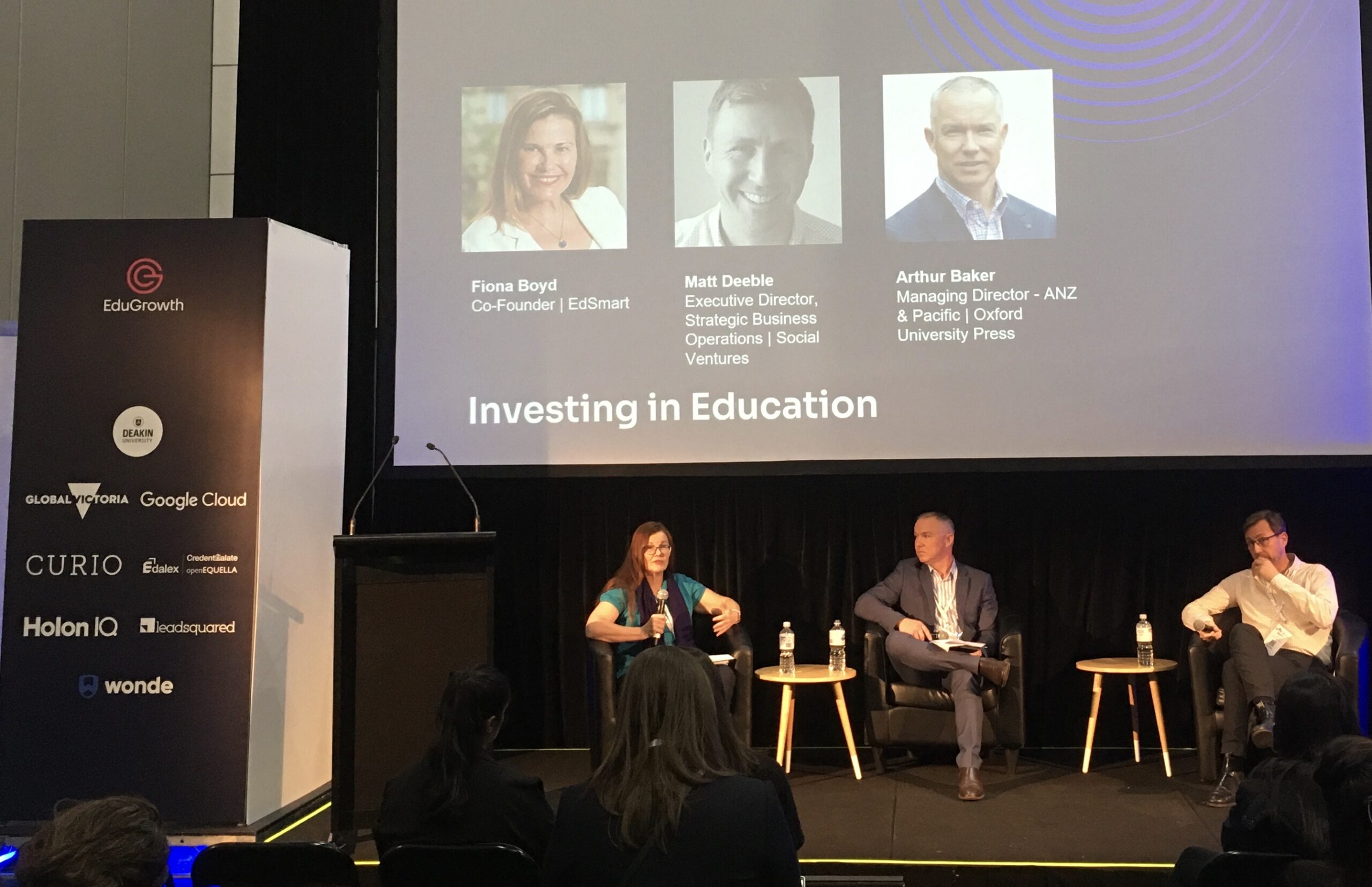As part of Innovation Alley at EduTECH, the Melbourne EdTech Summit hosted a series of presentations addressing the theme ‘Education Unlimited’. Here’s one of them.
On 11th August 2022, Fiona Boyd, EdSmart’s Co-Founder and Director – Business Development, chaired a panel, ‘Investing in Education’ as part of the Melbourne EdTech Summit, an initiative from EduGrowth.
Joining Fiona to discuss some of the issues that affect financial investment in education were Matt Deeble, Executive Director of Social Ventures Australia (SVA). Matt was previously a director in SVA’s education practice and he’s founder of Evidence for Learning. Over a 25-year career, he has held executive positions in ventures across education, health and clean technologies.
Also on the panel was Arthur Baker, Managing Director (Australia and Pacific) for Oxford University Press. Before joining Oxford University Press, Arthur built sales and marketing teams across key publishers in the K-12 sectors, including Pearson. He is currently a director of The Copyright Agency.
Across the course of their discussion, Fiona, Matt and Arthur touched on important areas relating to investment in education including the differences between investing for profit and investing for impact, the challenges for investors who get into education with the aim of driving change, the social impacts of EdTech, and what products might be missing in the market.
Following is a transcript of their discussion edited for clarity and word length.
Fiona Boyd: “Firstly, Arthur, Oxford University Press [OUP] is a traditional publisher with literally centuries of expertise in producing high-quality educational resources. What is your role in investing in the growth of the EdTech sector?”
Arthur Baker: “From an OUP perspective, we’re a company that’s been servicing education for 500 years so, effectively, investing in education is what we do. And in this market, we’re certainly focused on being a core curriculum creation enterprise.”
“As far as EdTech goes, one of the things that we do, that a lot of our traditional competitors don’t do, is spend time developing partnerships so we can support the broader ecosystem in schools.”
Matt, you invest in education too, but with a lens of social impact. What is the difference between investing for profit and investing for impact?
Matt Deeble: “Well, you hope that they line up – that’s when you get to the sweet spot. I think we sometimes get a bit confused when we talk about investment because it gets used in lots of different ways. In the world of impact investing, we’re talking about private capital — people’s private money — being deployed into ventures and activities.”
“In the normal world of investing, you should think about it as a spectrum. At one end, you’ve got the things that we’re all used to in terms of our super funds, or private people investing into businesses on the stock exchange. At the far end of that spectrum is, ‘I don’t care what industry it’s involved in. I just want to see a return on my money of five, 10, 15 [or] 100 percent’ and you’ll calibrate the risk. Then at the other end, there’s philanthropy where everybody’s interested in doing good work.”
“Impact investing is a class in the middle where people are deploying private money and expecting a return on the money, but they have a view about what kinds of investments they’re going to make. That could be quite loose and they say, ‘I think education’s good, therefore I’ll invest in education.’ Or – and this is the space that SVA operates as a non-profit player – they can move a little further towards philanthropy and say, ‘Maybe I’m prepared to give up some returns because of the quality of change that’s going to occur with that investment’.”
“All of the ambition that sits around that is trying to understand what’s the financial perspective, and what’ s the social benefit. Education is a fantastic sector for impact investment thinking because it’s fundamentally human, and the benefits that accrue to an individual [from an education] ultimately accrue to the rest of society as well. So, it’s really rich terrain to make these sorts of thoughtful investments.”
Matt, Where do you see the social impacts of EdTech?
Matt Deeble: “This is my chance for a controversial statement (laughs). I think a lot of investors are pretty lazy in the way they think about investing in education or in EdTech. It begins with, ‘Education is good. We’re [investing in] education, so it’s all good’. And they don’t do anything more sophisticated or thoughtful than that. They take it on-spec that anything we do is probably okay.”
“But, you face more regulation releasing lipsticks onto the market than you do when putting an education product into schools. There are no claims that have to be backed up or substantiated. There’s no regulator that says your product must do what you say it does. So, we are a big advocate for people being more rigorous in the way in which they understand and think about the impacts of their product, their service or their engagement”.
“We encourage the companies that we look at to describe what we call ‘the theory of change’ – or a theory of action – what it is about your product that is going to make a difference? Talk to us about that. Our thesis is, if you do that right, you’re actually going to be more likely to generate good financial returns because the rigour that you put into your financial measurement should also be put into your efficacy, your social impact – the change that you’re actually making to the sector.”
Arthur, do these EdTech products have an impact on your work at OUP?
Arthur Baker: “They absolutely do. I think a lot of EdTech founders think that one of their objectives is to disrupt the traditional players, whereas I’d like to think that we’re all operating in an important and very complex ecosystem, and that one of the things that we could do to best serve our educator customers and learners is find ways to work together in partnership to deliver real change, and to deliver products and services that are more holistic, rather than individual niche products that require a lot of change management to implement.”
EdTech has long held promise as a growth sector. I think investors with a purely financial lens look at education and they say to themselves that it’s ripe for disruption. But it’s slowed a lot of investors down since the late ’90s through to now.
Matt, what are those challenges that have led some investors to burn money and go nowhere?”
Matt Deeble: “I think you’re right – many [investors] pile in thinking education is the next thing that’s ripe for disruption, and ignore some of the deep structural differences that exist in education, and then see their hopes dashed.”
“I think investors are becoming sophisticated enough to ask how ripe for change is the sector you’re playing in. And what kind of change are you talking about making? Those that are more clear-eyed about where that change is can do very well. I like to joke that education’s a ‘get rich slowly’ business, not a ‘get rich quicker’ business.”
From an OUP point of view, and as a long-standing player, how do we invest in fast-moving tech products when servicing a slow-moving education market?
Arthur Baker: “Just to echo Matt’s comment, slow and steady wins the race. Investing in education is a long-term play, and I think it helps if you’re mission-driven as well.”
“I think the things that investors need to think about relate to the structural nature of the environment within which we operate. You’ve got challenges where funding models vary state by state, sector by sector, and you’ve got change management challenges to be addressing.”
“You’ve also got a number of things to think about with regard to how schools manage procurement. For example, how they manage conversations with the parents about the changes that they’re bringing forward; educator readiness, which has improved dramatically as we’ve been forced to support students remotely and virtually throughout the last number of years; and issues around data and privacy. So, there are a lot of things for a new EdTech business to be thinking about, and for investors to be considering in terms of their journey.”
“I think gone are the days where we can invest in a product, deliver it, and make a profit. Now, when you’re looking at a business case, you have to plan for a long-term product lifecycle that sees continuous investment supporting the evolution of a product based on the changing lens of your customer.”
I want to discuss tools that learners are being impacted by globally. One would hope that it leads to learners anywhere on the planet being able to learn at any time – but is this true? Arthur, do you see that as being the case?
Arthur Baker: “I think globalisation is a theme right across our economic environment, but it’s interesting to see, and to think about, what kind of product or service can truly scale globally, and what products or services need to be nested within a market.”
“In the Australian education landscape, you’ve got multiple jurisdictions with multiple [curricula] being employed. So, as a curriculum and content business, OUP has branches in most countries that focus on producing content specifically to meet the needs of those markets.”
“I think it depends on whether you want to be a multi-domestic player and focus on individual market needs or, alternatively, if you’re going global and you can set up an infrastructure and the kind of service that truly can scale regardless of different market conditions.”
I’ll go to you for the same question, Matt.
Matt Deeble: “Many learners – particularly those most advantaged – can already do that. There are a set of reasons why they don’t. But, in the area that we focus on, there are many people for whom that’s just not even possible because of barriers to access or the lack of materials.”
“Education is a deeply social and human activity. And it’s nuanced — your learning exists in the context of a geography, of a sociology, of your history and your background. So, the potential for things to be global is better than it ever has been, and that’s great for investors, because the chance to access markets you couldn’t otherwise access is there. But the flip of that is, unless it is relevant in the context of the human activity of learning, it’s unlikely to either be very effective or actually make lasting change.”
I’d like to throw what I think is an interesting question to both of you, and I’ll start with you, Arthur: What EdTech product is not in the market yet but, from where you sit, should be?
Arthur Baker: “I don’t think it’s actually one product. From an educator or learner perspective, the real gap is an integrated offer that supports the full teaching and learning cycle – really great content to support learner diagnostic assessments to help the educator know where the learner is. Feedback comes in from that assessment to prescribe the next steps for that individual learner and help the educator with that student pathway. That means the student can become more successful, and the educator can fulfil the responsibilities of moving those students along through the curriculum outcomes, as set by each jurisdiction. Then they can track that student’s progress so that both the student, their parents and the educator can see that progression in real-time.”
“For that to happen, we would need a coalition of multiple providers coming together to complete that framework and make it work, and I can’t see it anywhere at the moment. It feels like it would make a very, very big difference in the day of the life of the classroom teacher, and it would help students better track their progress, and be more motivated by success when they can see in real-time how they’re tracking.”
What’s the missing piece in your opinion, Matt?
Matt Deeble: “It’s definitely not a single product. I’m quite interested in the ‘plumbing’ — I think that we have pools of data but they’re not joined up; for example, a health record, school systems, department systems and data held by private vendors. All of them are trying to improve the experience for the people they’re talking about, but there’s a lot of hard work and, often, not much joy in trying to join those things up to create the views.”
“The plumbing is where I think we can see some huge benefits for everybody already in the ecosystem – if we let the water flow.”
So, my final question, when we think about transforming learning, where are you most bullish for future investment?
Arthur Baker: “Collaborations and partnerships to create a more integrated solution for education customers, which help students manage their progress more effectively – that feels to me like the holy grail. If you’re a classroom teacher or a student right now, I think that’s where I’d be putting my money.”
Matt Deeble: “One of our values at SVA is about putting people at the centre. We try to do that in ways in which we think about service and system design and delivery. I think we’re right on the cusp of people breaking down barriers about the view of a person and, rather than saying, ‘I see you as a student at my school’, those who are starting to appreciate the full human complexity, and then meet that complexity in ways to deliver better experiences for those people, is when we’ll take the next-step change.”
Contact us to find out how EdSmart can help to deliver a range of benefits to your school.



